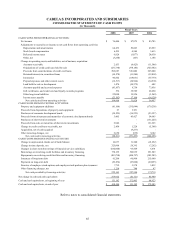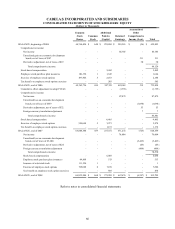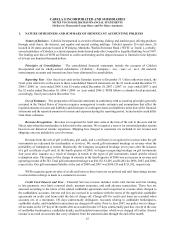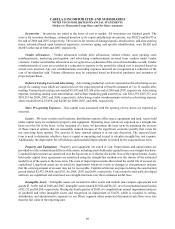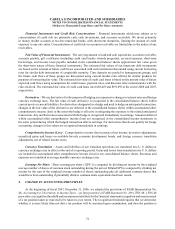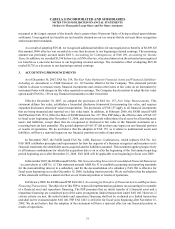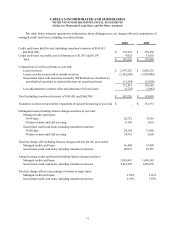Cabela's 2008 Annual Report Download - page 73
Download and view the complete annual report
Please find page 73 of the 2008 Cabela's annual report below. You can navigate through the pages in the report by either clicking on the pages listed below, or by using the keyword search tool below to find specific information within the annual report.68
CABELA’S INCORPORATED AND SUBSIDIARIES
NOTES TO CONSOLIDATED FINANCIAL STATEMENTS
(Dollars in Thousands Except Share and Per Share Amounts)
Cost of Revenue and Selling, Distribution, and Administrative Expenses – Our cost of revenue primarily
consists of merchandise acquisition costs, including freight-in costs, as well as shipping costs. Our selling,
distribution, and administrative expenses consist of the costs associated with selling, marketing, warehousing, retail
store replenishment, and other operating expense activities. All depreciation and amortization expense is associated
with selling, distribution, and administrative activities, and accordingly, is included in this same category on the
consolidated statement of operations.
Cash and Cash Equivalents – Cash equivalents include credit card and debit card receivables from other
banks, which settle within one to four business days. Receivables from other banks totaled $9,889 and $9,711 at
the end of 2008 and 2007, respectively. Unpresented checks, net of available cash bank balances, are classified as
current liabilities. Cash and cash equivalents of WFB were $402,058 and $123,163 at the end of 2008 and 2007,
respectively. Due to regulatory restrictions on our bank, we are restricted from using cash held by WFB for non-
banking operations.
Securitization of Credit Card Loans – WFB sells the majority of its credit card loans to a securitization
trust and recognizes related gains or losses as a component of securitization income in Financial Services revenue.
WFB must retain a minimum 20 day average of 5% of the interests in the securitization trust, which is known as a
“transferor interest” in the securitized loans, and ranks equal with the investor notes. Credit card loans classified
as held for sale, which includes the WFB’s transferor’s interest in securitized credit card loans, are carried at the
lower of cost or market. Net unrealized losses, if any, are recognized in income through a valuation allowance.
Although WFB continues to service the underlying credit card accounts and maintains the customer relationships,
these securitization transactions are treated as sales and the securitized loans are not included in our consolidated
balance sheet. Gains or losses are recognized at the time of sale, and depend in part on the carrying amount assigned
to the credit card loans sold, which is allocated between the assets sold and retained interest based on their relative
fair values at the date of transfer. WFB recognized gains on sales totaling $15,657, $22,740, and $17,410 for 2008,
2007, and 2006, respectively.
WFB retains certain interests in securitized loans, including a transferor’s interest, servicing rights, interest-
only strips, cash reserve accounts, and in some cases cash accounts. WFB classifies the interest-only strips and cash
reserve accounts as retained interests in asset securitizations. A servicing asset or liability is not recognized as WFB
receives adequate compensation relative to current market servicing rates.
In addition, WFB owns asset-backed securities from some of its securitizations, which are subordinated to
other notes issued. The asset-backed securities are classified as trading securities. Asset-backed trading securities
fluctuate daily based on the short-term operational needs of WFB. Advances and pay downs on the trading securities
are at par value. Therefore, the par value of the asset-backed trading securities approximates fair value.
WFB retains rights to future cash flows derived from finance charge collections, certain fee collections, allocated
interchange, and recoveries on charged-off accounts net of collection costs, arising after investors have received the
return for which they are entitled; reimbursement for charged-off accounts; and after certain administrative costs,
such as servicing fees of operating the trust. This portion of the retained interests is known as interest-only strips and
is subordinate to investor’s interests. For interest-only strips and cash reserve accounts, WFB estimates related fair
values based on the present value of future expected cash flows using assumptions for credit losses, payment rates,
and discount rates commensurate with the risks involved, but does not include interchange income since interchange
income is earned only when a charge is made to a customer’s account. The value of the interest-only strips and cash
reserve accounts are subject to credit, payment rate, and interest rate risks on the loans sold. For cash accounts,
WFB estimates related fair values based on the present value of future expected cash flows using discount rates
commensurate with the risks involved. Fair value changes in the interest-only strips and cash reserve accounts are
recorded in securitization income included in Financial Services revenue. Actual results could differ materially from
the estimates, and changes in circumstances could result in significant future changes to the assumptions currently
being used.









